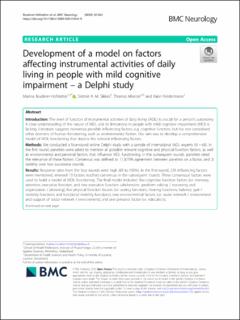Bitte benutzen Sie diese Kennung, um auf die Ressource zu verweisen:
https://doi.org/10.21256/zhaw-20547| Publikationstyp: | Beitrag in wissenschaftlicher Zeitschrift |
| Art der Begutachtung: | Peer review (Publikation) |
| Titel: | Development of a model on factors affecting instrumental activities of daily living in people with mild cognitive impairment : a Delphi study |
| Autor/-in: | Bruderer-Hofstetter, Marina Sikkes, Sietske A. M. Münzer, Thomas Niedermann Schneider, Karin |
| et. al: | No |
| DOI: | 10.1186/s12883-020-01843-9 10.21256/zhaw-20547 |
| Erschienen in: | BMC Neurology |
| Band(Heft): | 20 |
| Heft: | 264 |
| Erscheinungsdatum: | 2020 |
| Verlag / Hrsg. Institution: | BioMed Central |
| ISSN: | 1471-2377 |
| Sprache: | Englisch |
| Schlagwörter: | Cognitive function; Delphi study; Environmental factor; Instrumental activities of daily living (IADL); Mild cognitive impairment (MCI); Model; Personal factor; Physical function |
| Fachgebiet (DDC): | 616.8: Neurologie und Krankheiten des Nervensystems |
| Zusammenfassung: | Introduction: The level of function of instrumental activities of daily living (IADL) is crucial for a person’s autonomy. A clear understanding of the nature of IADL and its limitations in people with mild cognitive impairment (MCI) is lacking. Literature suggests numerous possible influencing factors, e.g. cognitive function, but has not considered other domains of human functioning, such as environmental factors. Our aim was to develop a comprehensive model of IADL functioning that depicts the relevant influencing factors. Methods: We conducted a four-round online Delphi study with a sample of international IADL experts (N = 69). In the first round, panelists were asked to mention all possible relevant cognitive and physical function factors, as well as environmental and personal factors, that influence IADL functioning. In the subsequent rounds, panelists rated the relevance of these factors. Consensus was defined as: 1) ≥70% agreement between panelists on a factor, and 2) stability over two successive rounds. Results: Response rates from the four rounds were high (83 to 100%). In the first round, 229 influencing factors were mentioned, whereof 13 factors reached consensus in the subsequent rounds. These consensual factors were used to build a model of IADL functioning. The final model included: five cognitive function factors (i.e. memory, attention, executive function, and two executive function subdomains -problem solving / reasoning and organization / planning); five physical function factors (i.e. seeing functions, hearing functions, balance, gait / mobility functions and functional mobility functions); two environmental factors (i.e. social network / environment and support of social network / environment); and one personal factor (i.e. education). Conclusions: This study proposes a comprehensive model of IADL functioning in people with MCI. The results from this Delphi study suggest that IADL functioning is not merely affected by cognitive function factors, but also by physical function factors, environmental factors and personal factors. The multiplicity of factors mentioned in the first round also underlines the individuality of IADL functioning in people with MCI. This model may serve as a basis for future research in IADL functioning in people with MCI. |
| URI: | https://digitalcollection.zhaw.ch/handle/11475/20547 |
| Volltext Version: | Publizierte Version |
| Lizenz (gemäss Verlagsvertrag): | CC BY 4.0: Namensnennung 4.0 International |
| Departement: | Gesundheit |
| Organisationseinheit: | Institut für Physiotherapie (IPT) |
| Publiziert im Rahmen des ZHAW-Projekts: | Test der Deutschen Version des Amsterdam-IADL-Fragebogens® bei Personen ohne und mit leichter Hirnleistungsschwäche |
| Enthalten in den Sammlungen: | Publikationen Gesundheit |
Dateien zu dieser Ressource:
| Datei | Beschreibung | Größe | Format | |
|---|---|---|---|---|
| 2020_Bruderer-Hofstetter-etal_Factors-affecting-instrumental-activities_BMC-Neurology.pdf | 733.83 kB | Adobe PDF |  Öffnen/Anzeigen |
Zur Langanzeige
Bruderer-Hofstetter, M., Sikkes, S. A. M., Münzer, T., & Niedermann Schneider, K. (2020). Development of a model on factors affecting instrumental activities of daily living in people with mild cognitive impairment : a Delphi study. BMC Neurology, 20(264). https://doi.org/10.1186/s12883-020-01843-9
Bruderer-Hofstetter, M. et al. (2020) ‘Development of a model on factors affecting instrumental activities of daily living in people with mild cognitive impairment : a Delphi study’, BMC Neurology, 20(264). Available at: https://doi.org/10.1186/s12883-020-01843-9.
M. Bruderer-Hofstetter, S. A. M. Sikkes, T. Münzer, and K. Niedermann Schneider, “Development of a model on factors affecting instrumental activities of daily living in people with mild cognitive impairment : a Delphi study,” BMC Neurology, vol. 20, no. 264, 2020, doi: 10.1186/s12883-020-01843-9.
BRUDERER-HOFSTETTER, Marina, Sietske A. M. SIKKES, Thomas MÜNZER und Karin NIEDERMANN SCHNEIDER, 2020. Development of a model on factors affecting instrumental activities of daily living in people with mild cognitive impairment : a Delphi study. BMC Neurology. 2020. Bd. 20, Nr. 264. DOI 10.1186/s12883-020-01843-9
Bruderer-Hofstetter, Marina, Sietske A. M. Sikkes, Thomas Münzer, and Karin Niedermann Schneider. 2020. “Development of a Model on Factors Affecting Instrumental Activities of Daily Living in People with Mild Cognitive Impairment : A Delphi Study.” BMC Neurology 20 (264). https://doi.org/10.1186/s12883-020-01843-9.
Bruderer-Hofstetter, Marina, et al. “Development of a Model on Factors Affecting Instrumental Activities of Daily Living in People with Mild Cognitive Impairment : A Delphi Study.” BMC Neurology, vol. 20, no. 264, 2020, https://doi.org/10.1186/s12883-020-01843-9.
Alle Ressourcen in diesem Repository sind urheberrechtlich geschützt, soweit nicht anderweitig angezeigt.